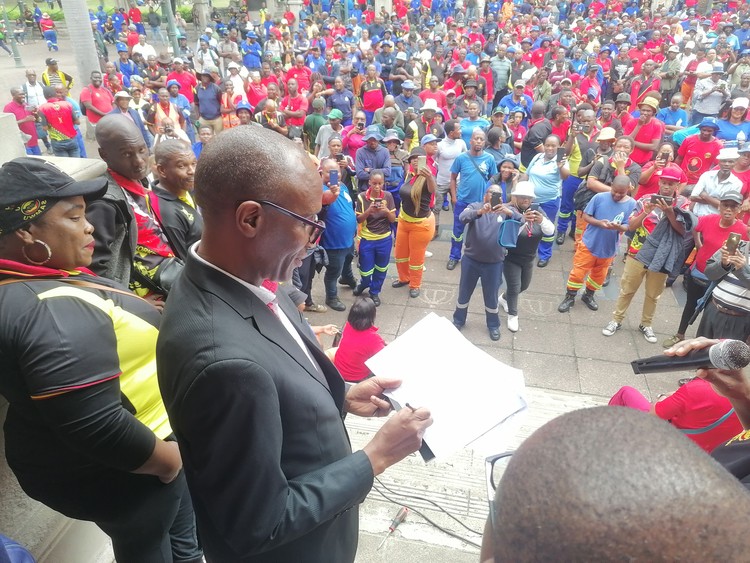Hundreds of eThekwini municipal workers march for higher wages
But stoppage fell short of SAMWU’s plan for a city-wide shutdown, says municipality
Khayo Mpungose, from the office of eThekwini Mayor Mxolisi Kaunda, accepted the memorandum of demands from municipal workers on Tuesday. Photo: Joseph Bracken
Some eThekwini municipal workers downed tools for a second day on Wednesday. This followed a march by hundreds of municipal workers, members of the South African Municipal Workers’ Union (SAMWU), in Durban’s city centre on Tuesday.
The workers say their wages do not match those of workers in other metropoles like Ekurhuleni and Tshwane.
Khayo Mpungose from Mayor Mxolisi Kaunda’s office accepted the memorandum on Tuesday. The mayor was attending the State of the Province address.
SAMWU Regional secretary of Xolani Dube said that the union’s analysis suggested that they found that municipal workers in other metros earned “far more” than they did in eThekwini. For example, a general worker in eThekwini earns about R10,000 a month while general workers in Tshwane and Ekurhuleni earn about R13,900, Dube said.
“We are all metropolitan municipality workers…We will be waiting for the eThekwini municipality to respond to our memorandum and won’t do any work,” said Dube.
But when GroundUp checked on Wednesday morning, most municipal services were operating normally, with a few workers participating in the stoppage.
Municipal spokesperson Gugu Sisilana said only about 500 of the City’s 27,000 workforce had participated in Tuesday’s unprotected strike, dismissing claims by the union of a city-wide shutdown.
Sisilana warned that the “no work, no pay and no benefits” principle would apply to employees who participated in the strike. “Consequence management will also be implemented, “said Sisilana, adding that the workers’ grievances must be resolved through appropriate channels.
Support independent journalism
Donate using Payfast

Next: PRASA relocation of railway line occupiers was illegal, claims City of Cape Town
Previous: Echoes of District Six evictions in case before the Constitutional Court
© 2024 GroundUp. This article is licensed under a Creative Commons Attribution-NoDerivatives 4.0 International License.
You may republish this article, so long as you credit the authors and GroundUp, and do not change the text. Please include a link back to the original article.
We put an invisible pixel in the article so that we can count traffic to republishers. All analytics tools are solely on our servers. We do not give our logs to any third party. Logs are deleted after two weeks. We do not use any IP address identifying information except to count regional traffic. We are solely interested in counting hits, not tracking users. If you republish, please do not delete the invisible pixel.

